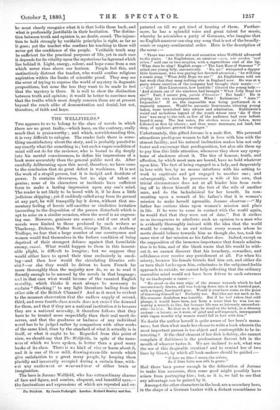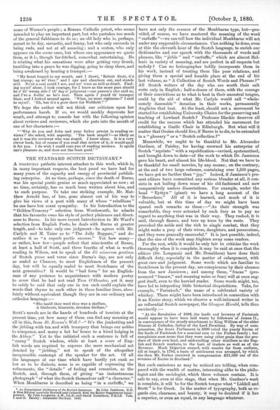THE WELLFIELDS.*
Tins appears to us to belong to the class of novels in which there are no great faults,—which have, on the contrary, really much that is praiseworthy ; and which, notwithstanding this, it is very difficult to eulogise. The reader feels there is some- thing unsatisfactory about the story, and is probably puzzled to say exactly what the something is ; but such a vague condition of mind will not do for the reviewer, who is bound to dig deeply into his mental consciousness, to define his impressions of a book more accurately than the general public need do. After 'carefully deliberating upon this novel, therefore, we have come to the conclusion that its great defect is washiness. It is not the work of a stupid person, but it is insipid and destitute of power. It contains cleverness, but no sign of talent or genius ; none of its characters or incidents have sufficient force to make a lasting impression upon any one's mind. The reader is not likely to be bored with it, if he does a little judicious skipping ; yet if suddenly called away from its perusal at any part, he will tranquilly lay it down, without that mo- mentary feeling of heroic self-sacrifice or vindictive irritation (according to the disposition of the person disturbed) which is apt to arise on a similar occasion, when the novel is an engross- ing one. However, geniuses are scarce ; and if our stock of novels were limited to those produced by such writers as Tha.ckeray, Dickens, Walter Scott, George Eliot, or Anthony Trollope, we fear that a large number of our countrymen and women would find themselves in the forlorn condition of being deprived of their strongest defence against that formidable enemy, ennui. What would happen to them in this lament- able plight, is difficult to imagine ; but we suppose they would either have to spend their time exclusively in smok- ing—and then how would the circulating libraries sub- aist ?—or else they would be driven to learn French far more thoroughly than the majority now do, so as to read it fluently enough to be amused by the novels in that language; nal in that case what would become of the vaunted English m orality, which thinks it must always be necessary to exclaim " Shocking I" to any light literature hailing from the other side of the British Channel ? And as it must be evident to the meanest observation that the endless supply of second, third, and even fourth-class novels does not exceel the demand for them, and that if they are a national institution it is because they are a national necessity, it therefore follows that they have to be treated more respectfully than their real merit de- serves, and that the goodness or badness of any individual novel has to be judged rather by comparison with other works of the same kind, than by the standard of what it actually is in itself, or what it ought to be. Regarded from this point of view, we should say that The Wellftelds, in spite of the tame- ness of which we have spoken, is bstter than a good many books of its class. Thera is no kind of vice or harm about it, and it is one of those mild, drawing-room-life novels which give satisfaction to a great many people, by keeping them placidly and innocently occupied daring a certain time, with- oat any exciteniat or wasx-ani-tear of either brain or imagination.
The hero is Jerome Wellfield, who has extraordinary charms of face and figure, and sombre, eloquent, and beautiful eyes,— the fascinations and expressions of which are repeated and ex-
The Weliflehis. By Jessie FothergIll. London : ItIchard Bentley and Bon.
patutted on till we get tired of hearing of them, Further- more, he has a splendid voice and great talent for music, whereby he astonishes a party of Germans, who imagine that no English amateur can sing any song that is not of the broadly. comic or sugary-sentimental order. Here is the description of the scene :—
"There was some little stir and sensation when Wellfield advanced to the piano. An Englishman, an amateur—nun, wit werden 'mat selum r said one or two sceptics, with a supercilious curl of the lip.
What does he sing? English songs—" The Last Rose of Summer" ?'
asked one young lady, sarcastically. No, no !' whispered a dapper little lieutenant, who was paying her devoted attention ; he will sing a comic song, "What Jolly Dogs we are!" An Englishman told me last week that they sang nothing else in England now. He was at a party where nineteen of the company bad brought their music—' —` Gott ! Herr Lieutenant, how horrible !' tittered the young lady.— ' And sixteen oat of the nineteen had brought " What Jolly Dogs we are !" Fact, I assure you, parole d'honneur ! But hush ! He is playing his own accompaniment. What ! Rubinstein! " Asra !" Impossible !' If so, the impossible was being performed in a masterly manner. Would-be sarcastic lieutenants, tittering young ladies, were bewitched into silence and admiration. Rubinstein'a weird and melodious legend of the youth whose race die if they love' was sung to the end, as few of the audience had ever before heard it sung. The last notes, Die sterben wean sie lieben, were followed at first by silence ; and then some murmurs, not loud, but deep, of applause, greeted the singer."
Unfortunately, this gifted Jerome is a male flirt. His personal attractions predispose women to fall in love with him with the utmost facility, and his natural inclination makes him not only foster and encourage that predisposition, but also stir them up to pay him this little attention, whenever they show any symp- toms of slackness about it. The ties of honour, truth, and affection, by which most men are bound, have no hold whatever upon him. The fact of being engaged to a lady, and desperately in love with her, by no means interferes with his setting to work to captivate and get engaged to another one ; and subsequently, when he possesses a wife of his own, that trivial circumstance does not at all hinder him from rush- ing off to throw himself at the feet of the wife of another man, and do the lackadaisical for her benefit. In com- menting upon a remark of his father's that it is woman's mission to make herself agreeable, Jerome observes :—" My father has curious ideas upon woman's mission and place in life. If he were to come in contact with the world again, he would find that they were out of date." But it strikes us as incongruous to attribute such an opinion to a man who is evidently thoroughly imbued with the idea that the world would be coming to an end unless every woman whom he meets should behave towards him as though she, too, took the same view of her mission as his father does. Indeed, except on the supposition of the immense importance that female admira- tion is to him, and of the blank waste that life would he with- out it, we cannot discover that his treachery, cowardice, and selfishness ever receive any punishment at all. For when his misery, because his female friends find him out, and either die or turn their Lacks upon him, culminates in the subjoined feeble approach to suicide, we cannot help reflecting that the ordinary masculine mind would not have been driven to such extremes by so inadequate a cause :—
"He stood on the very edge of the stream towards which he had unconsciously drawn, and was looking down into it as it hurried past, with a vague, fascinated gaze. Would it ever have come to the point of throwing himself in ? Probably not. Suicides are not each as be. His remorse doubtless was horrible. But if he had taken that cold plunge, it would have been, not from a sense that he was too un- worthy a wretch to live, but because life was so intensely uncomfort- able—to him. Be that as it may, be stood on the brink, in a dreamy ecstasy—a luxury, as it were, of grief and self-reproach, interspersed with vague wonder why women would fall in love with him."
No doubt the author herself is quite aware of her hero's mean- ness; but then what made her choose to write a book wherein the most important person is too abject and contemptible to be in- teresting? If the chief element of her dish is flabby, she cannot
complain if flabbiness is the predominant flavour left in the mouth of whoever tastes it. We are inclined to ask, what was the use of this despicable creation ? and to remind her of two lines by Giusti, by which all book-makers should be guided:— "II fare nn iihro b meno che nikte, Be il libro fatto non rifh le. gente."
Had there been power enough in the delineation of Jerome to make him nauseous, then some good might possibly have arisen from portraying him ; but, as it is, we fail to see that any advantage can be gained by it.
Amongst the other characters in the book are a secondary hero, in the shape of a German banker with a distant resemblance to some of Werner's people ; a Roman Catholic priest, who seems intended to play an important part, but who partakes too much of the general flabbiness to do so ; an old lady who is, perhaps, meant to be dry, sarcastic, and funny, but who only succeeds in being rude, and not at all amusing ; and a sexton, who only appears on the scene once, but whose one appearance we quote from, as it is, though far-fetched, somewhat entertaining. He is relating what his sensations were after getting very drunk, tumbling into a grave he was digging, going to sleep there, and being awakened by hearing a trumpet
"My heart lonped to my month, and I thowt, Robert Stott, it's last trump; up wi' thee !' and I ups and clambers out, and stands still. Ne'er a soul could I see, and aw' were as still as death. Find- ing mysel' alone, I took courage, for I knew as the more part should be o' th' wrong side th' day o' judgment—our parson's olez said so, and I've a feelin' as he's rect. Then again I yeard th' trumpet blast, and I looked around again. What, no more righteous?' I said to mysel'. 'Eh, but it's a poor show for Wellfield !' "
We hope the author will not think our criticism upon her performance harsh. If so, we would meekly deprecate her wrath, and attempt to console her with the following opinion about reviews and reviewers, which she puts into the mouth of one of her characters
:- '"Why do you and John and your father persist in reading re- views ?' she asked, with asperity. The book stupid ?—as likely as not it was the reviewer who was stupid. / know them. It is a very clever book, but of course if you read that review of it, it would spoil it for you. I do wish I could cure you of reading reviews. It spoils one's pleasure so, and does not the least good.'"



































 Previous page
Previous page